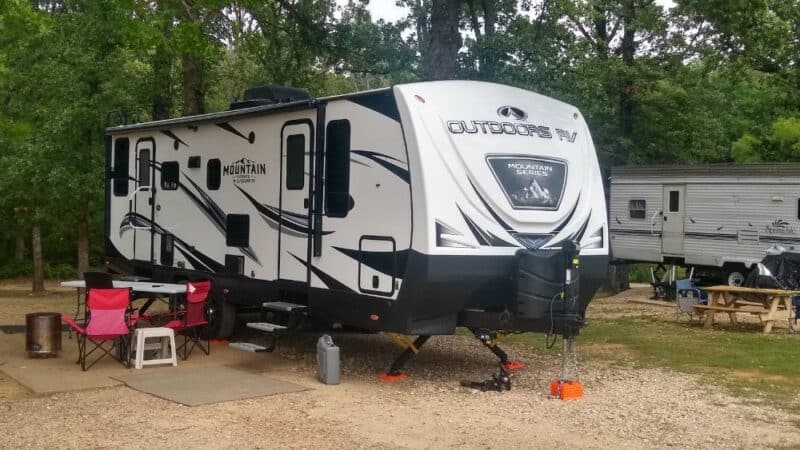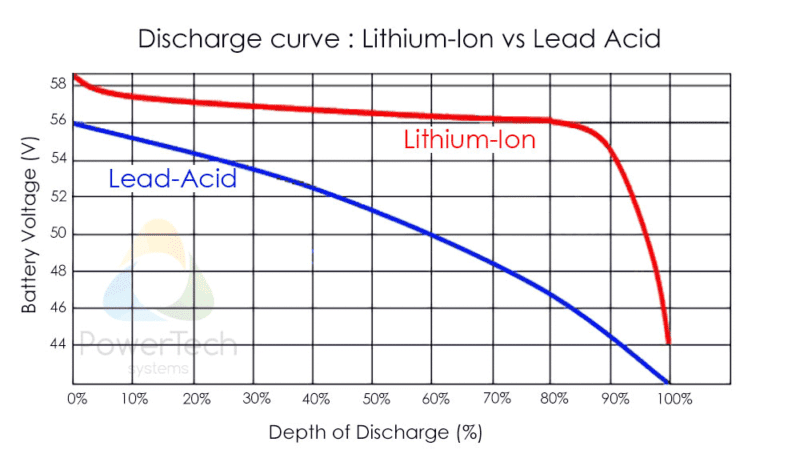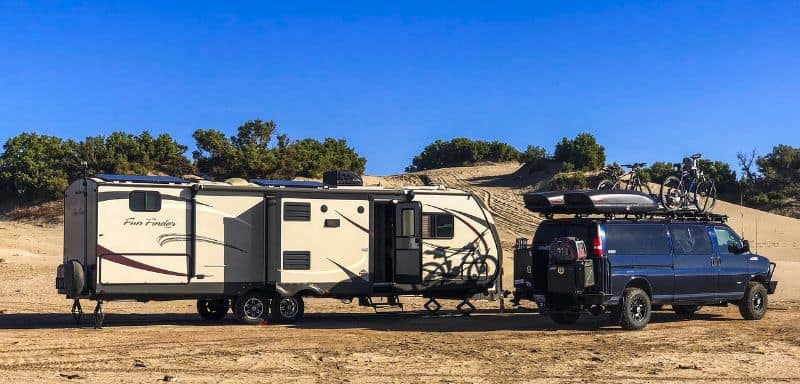If you thought regular RV batteries were expensive, you’re about to throw up a little.
Lithium batteries cost the proverbial arm and a leg. Even a barebones lithium battery costs about $500. Decent deep-cycle lithium batteries cost about $750, and brand-name RV lithium batteries with integrated heating systems can cost $1,300!
But somehow, in a country where we demand $1 McDonald’s burgers and trust our groceries to Family Dollar, lithium batteries have become the hottest thing in the RV aftermarket.
So you’re probably wondering: Are lithium batteries worth it? Are they really deserving of the hype?
If you’re late for work and don’t have time to read this entire article, then here’s the answer. Yes, lithium batteries are (probably) worth it. The more you camp off-grid, the better they are!
There. You’re welcome. I give you permission to go spend $2,000 – $4,000 to upgrade your battery bank, replace your converter, reconfigure your solar charge controller, and to do whatever else is necessary to convert your RV to lithium batteries.
…. But there’s an “it depends” coming!
Who This Guide Is For (And Not For)
Let me be clear: This post is for motorhome or trailer RV owners interested in purchasing lithium-ion batteries for onboard house batteries. This isn’t for marine or automotive hybrid starting batteries – that’s a completely different topic.
(By the way, for our purposes, any reference to an RV lithium battery refers to Lithium Iron Phosphate (LiFePO4) batteries, also known as LFP batteries.)
I won’t waste your time rehashing the benefits of a lithium battery. You can review my guide to converting your RV to lithium batteries if you’re interested in the nuts and bolts. Instead, let’s get into the math (don’t worry, it’s easy!)
Yes, lithium batteries cost more. But they also last longer. That’s the basic science. So we simply want to know if a lithium battery will last long enough to pay for itself. We want to know the lifecycle cost.
So if an AGM battery costs $150 and lasts 500 cycles, is a $700 lithium battery a better deal if it lasts 3,200 cycles?
Actually, the math is really simple. Here, I even made a little calculator for it!
But Are Lithium Batteries Really Worth It For Everyone??
Of course, this calculator is a gross oversimplification. We’ve estimated the AGM battery lifetime at 500 cycles, for instance. How accurate is that assumption?
That might be waaaay too low! If you trickle-charge your battery to prevent sulfation, avoid high heating and extreme cold, and never dip below 50% state of charge, you could easily get 700 cycles or more out of your AGM lead-acid battery!
On the other hand, if you put your RV into winter storage for seven months with a deeply discharged battery that sulfates over the winter … then you’ve just killed your battery. So our estimate would be waaaay too high.
The truth is, real life is far more complicated than a simple calculator. So what are we missing?
Are lithium batteries worth it for an RV? It all comes down to what kind of camper you are!
Reasons to NOT Buy a Lithium RV Battery
You Don’t Camp Off-Grid
Do you camp only in campgrounds? If yes, then why would you splurge on lithium batteries? You only run off shore power anyway! The benefits of a lithium battery – more energy density for longer boondocking – would be wasted on you. Just enjoy the grid!

You Don’t Camp As Often As You Say
Do you camp more often in your imagination than in reality? If you only make it outside three or four weekends a year, do you really want to drop a few thousand dollars on upgraded batteries? Your batteries would outlast your camper! You could literally pass them onto your grandchildren. Probably not what they want.
You Camp Mostly in Freezing Weather
Do you camp primarily in freezing weather, like the Michigan UP or Pacific Northwest? If so, please see a psychiatrist, and secondly, lithium isn’t as tough as you are! Lithium batteries can freeze at temperatures below 32 degrees Fahrenheit. You’ll either need to:
- A) Warm the battery before charging it
- B) Purchase a lithium battery with a built-in heater
- C) Install the battery in a heated location
You Are Afraid of Electricity
Are you technologically challenged? Not being rude, I promise! But lithium batteries aren’t a drop-in replacement in most RVs. You typically need to replace your converter, maybe replace your battery fuse, and possibly recalibrate your solar controller. If you didn’t understand anything I just wrote, either stick with ol’ reliable AGM batteries, or find a techno-savvy friend.
You Are An Inexperienced RV Owner
Are you a new RVer? Far be it from me to dissuade anyone against pursuing higher quality, but I’m guessing you don’t have unlimited funds (if you do, please forgive me, and here’s a charity you should donate to). If you have to pick and choose which upgrades are most important, I wouldn’t put lithium batteries first.
Remember, most people switch to lithium because they discover they love boondocking and hate generators. Nine times out of 10, an upgrade to lithium batteries is accompanied by a large investment in solar panels, solar controller, and inverter/charger. It’s not cheap. You can easily drop $3,000 or more! Why spend the money unless you’ve tested the lifestyle first?
Reasons to Switch to a Lithium RV Battery
You Have Little Leftover Cargo Capacity
Are you a weight weenie? Do you cut the handles off your toothbrush to save weight? If so, you’ll love lithium!
Lithium batteries have incredible energy density. On average, lithium batteries are about 2-3 times lighter than lead-acid batteries of the same capacity – and remember, lithium batteries provide more useable energy! So once you crunch all the numbers, a lithium battery bank can be just 20-25 percent of the weight of a lead-acid battery bank with the same kWh capacity. That’s incredible!
You Don’t Have Room for Multiple Batteries
Are you limited on space? For instance, if you’re replacing the batteries on your travel trailer tongue, and you only have room for one or two batteries, then you can get twice the capacity out of lithium! Plus, not only are lithium batteries lighter, they’re also smaller.
You Have to Charge Your Batteries Frequently
Are you impatient? Do you often find yourself desperately charging your house batteries at any available outlet? Lithium batteries can be recharged 3-6x faster.
You Run a Sensitive Equipment
Are you running “sensitive” equipment, like a CPAP machine? A lithium battery will maintain its voltage down to about 90 percent depth of discharge, as shown in the chart below, courtesy of PowerTech Systems.

You Boondock Often
Do you dry camp regularly? If so, you’ll love lithium! It’s perfect for you! Lithium batteries can be discharged all the way to 0-20 percent, unlike deep-cycle lead-acid batteries, which can only be safely discharged down to approximately 50 percent. Translation: One battery will last twice as long!
Plus, lithium batteries can A) be more quickly recharged than lead-acid and B) more efficiently discharge their energy. You might lose 15-20 percent of the energy you put into a lead-acid battery, but you’ll only lose about 5 percent of the energy pumped into a li-ion battery.

You Need to Install the Batteries Inside
Do you need to install batteries indoors? If so, you can use either type of battery – but lithium batteries are much easier to install! All lead-acid batteries, even “sealed” ones like AGMs, must be vented to the outdoors. That means you can’t just plop them inside an empty cabinet. But you can install a lithium battery just about anywhere!
You Forget to Maintain Your Batteries
Do you hate maintenance? If you’re constantly forgetting to top off your battery electrolyte, then A) either choose a sealed AGM lead-acid battery, or B) splurge on a lead-acid battery. Both are marketed as “maintenance-free.”
As you can see … I’ve listed more types of RV owners who would be interested in switching to lithium batteries than not. That’s a not-so-subtle hint that I believe most “serious” RVers would be better off with lithium house batteries.
But if that’s not you, or you don’t have an extra $2,000 to spend, then don’t sweat it! You don’t need lithium batteries to enjoy camping. Grandpa never had a lithium battery, and he has some pretty good stories to tell!
Leave a Reply